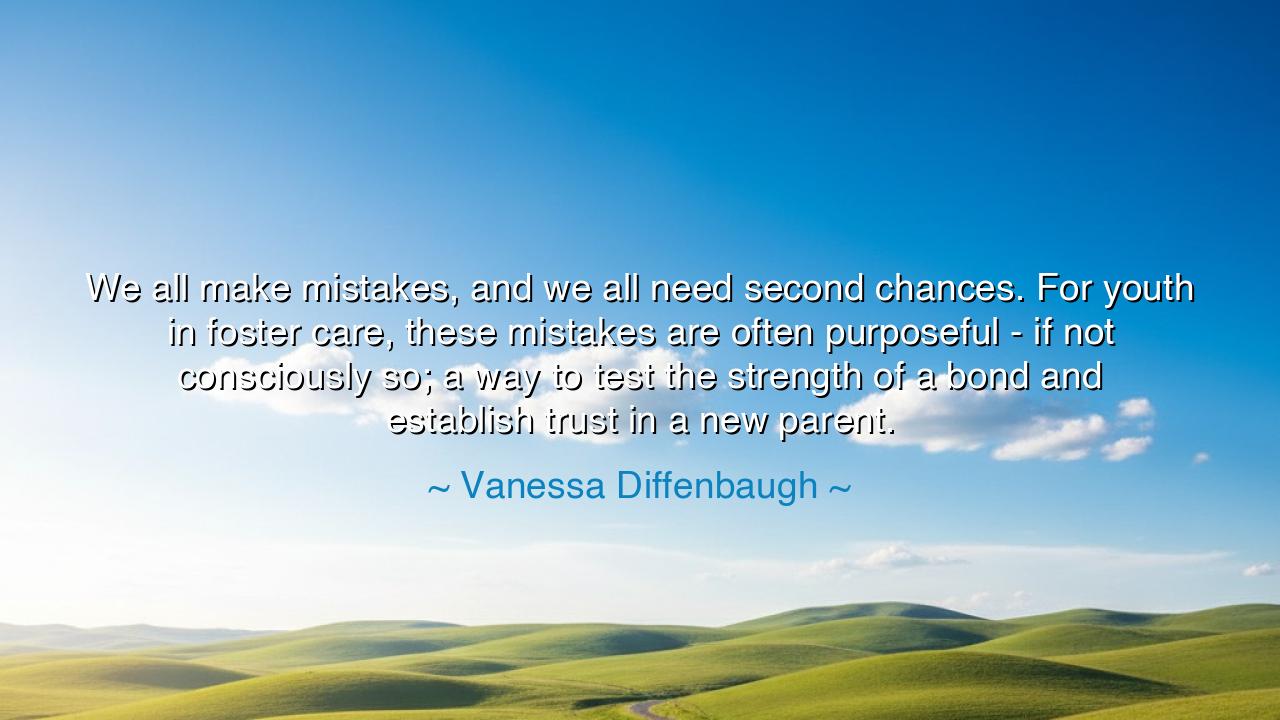
We all make mistakes, and we all need second chances. For youth
We all make mistakes, and we all need second chances. For youth in foster care, these mistakes are often purposeful - if not consciously so; a way to test the strength of a bond and establish trust in a new parent.






"We all make mistakes, and we all need second chances. For youth in foster care, these mistakes are often purposeful—if not consciously so; a way to test the strength of a bond and establish trust in a new parent." These words from Vanessa Diffenbaugh, novelist and advocate, rise from the depths of compassion and lived understanding. They remind us of a truth too often forgotten: that every soul stumbles, and that to heal, one does not need judgment but mercy, not punishment but patience, not rejection but the chance to begin again.
The ancients, too, knew the necessity of second chances. They told stories of gods who, though mighty, erred and sought forgiveness. They celebrated heroes who, though fallen, rose again. For what is life if not a journey of mistakes refined into wisdom? But Diffenbaugh speaks with special urgency for the children of foster care, whose mistakes are not merely errors of youth but often trials of trust—small rebellions that ask silently, “Will you still love me when I fail? Will you remain when I push you away?”
Such behavior may seem destructive, but it is, in truth, a cry for belonging. The child who has been abandoned or betrayed tests new bonds to know if they are real. They may break rules, shout words of anger, or withdraw into silence, not from malice but from fear. Their mistakes are shields and probes, ways to discover if the love offered is steadfast or fleeting. In this way, their errors are not merely missteps but acts of survival, a quest to find what is unshakable.
History offers us examples of this truth in broader form. Consider Abraham Lincoln, who endured many failures before rising to lead a nation. He was defeated in elections, lost in business, and scorned by his rivals. Yet each second chance revealed new strength within him, until at last he became the steady hand to guide America through its darkest hour. If greatness requires room for error and renewal, how much more must children, fragile and unformed, be granted that same grace?
The words of Diffenbaugh also rebuke a world quick to condemn. Too often society sees mistakes as final verdicts rather than stepping stones. But the soul cannot grow in soil of fear; it blossoms in the garden of patience. A parent, a teacher, a mentor—any who guide the young—must see beyond the surface of rebellion to the wounded heart beneath. For love that endures trial becomes love that heals. Trust is not given cheaply; it is earned through persistence in the face of rejection, through showing up again and again until the child knows they are safe.
The lesson is clear: to truly love is to allow for mistakes, to grant second chances, to hold steady when bonds are tested. Greatness in parenthood, mentorship, or friendship is not measured by how one responds to perfection, but by how one responds to failure. The strongest bonds are forged not in ease, but in trial, when love is proven indestructible.
Practically, this means approaching the failures of others with mercy rather than wrath. It means reminding yourself, when patience grows thin, that the mistake before you may be a question hidden in disguise: “Can I trust you?” Answer that question with steadiness, with compassion, with presence. For every time you endure the storm of another’s testing, you plant a seed of trust that may one day grow into unshakable loyalty.
So pass down Diffenbaugh’s wisdom: “We all make mistakes, and we all need second chances.” Tell it to children, who fear rejection; to parents, who feel tested; to leaders, who grow weary of failure. And whisper it to your own soul, for you too need the mercy you grant others. For in the end, it is not perfection that binds us together, but the willingness to love again and again, even after the fall.






AAdministratorAdministrator
Welcome, honored guests. Please leave a comment, we will respond soon